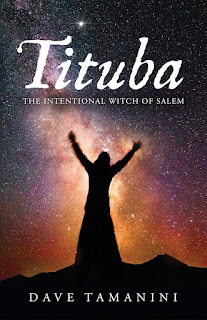Tituba: The Intentional Witch of Salem
Author: Dave Tamanini
Genre: Historical Fiction, Fantasy
Publisher: David F Tamanini
Release Date: 2020
Pages: 317
Source: Publisher/Netgalley in exchange for an honest review.
Synopsis: If you love historical fiction... come revisit Salem's terror in this provocative new telling of enslaved Tituba, no longer a caricature, but a fully human woman with magical powers.
Come! Let Tituba cast its spell with a unique and tantalizing tale that explores the wild emotions driving accusations of witchcraft in 1692.
A Promise and a Hope
Enslaved Tituba has been faithful to a promise to her dying mama in Africa. She has appeased the masters from Barbados to Boston to Salem and waited for her magic.
A Mother’s Agony
When Tituba’s only son dies trying to escape slavery, her life changes forever. After enduring the crush only a mother can feel, she rages and turns to vengeance.
Witches Tear into Salem
The villagers see witches and demons everywhere. Their ministers say the Devil has sent them to steal souls. But they are wrong. It is Tituba—disobeying an ancient rule—conjuring terrifying images with magic that sparks the infamous witch hunts of 1692.
A Woman’s Dilemma
As neighbors accuse neighbors of witchcraft, hysterical trials follow. And Tituba gloats in her power. But when hangings begin, her conscience arises. Can she confront her secret crime? And when a chance for redemption presents itself, will she take it?
My Review: Tituba retells the Salem Witch trials from Tituba’s perspective. Tituba was the first person to be accused of witchcraft in Salem. This novel paints Tituba as an actual witch and tells why she uses witchcraft. When the witchcraft trials begin and the hangings start, Tituba begins to feel remorse. Can Tituba ever be redeemed?
Tituba is a tragic character. She is a slave that works in a preacher’s household. Her preacher is cruel to her and makes her life miserable. Thus, she turns to witchcraft, and it makes her feel powerful. However, she feels remorse when she causes innocent people to die in the witchcraft trials. While I found myself empathizing with Tituba, I did not feel connected to her. I thought that she was not developed very well for she is mostly overshadowed by her master, Reverend Parris who I thought was more complex than she was. However, I did admire her role as a mother.
Overall, this novel is about choices, loss, and redemption. The characters were not really developed. However, I thought the author made Salem really come alive. He portrayed how superstitious the people of Salem were. Therefore, I found the setting to be the best part of the novel. The novel was also very slow in the beginning, but picked up pace during the witchcraft trials. Even though the author portrays Tituba as an actual witch, I don’t think she was historically. Still, I find this novel did justice to Tituba by showing her hardships. I recommend this book for fans of The Heretic’s Daughter, A Break with Charity, and The Sacrifice! Tituba is a novel that anyone who loves reading about the Salem Witchcraft Trials will not want to miss!
Rating: 3 out of 5 stars
This is the official book trailer of Tituba: The Intentional Witch of Salem:


Comments
Post a Comment